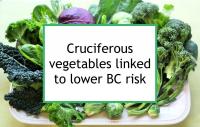Cruciferous vegetables incorporate several chemopreventive compounds, including sulforaphane (and the related erucin), indole-3-carbinol (I3C) and benzyl isothiocyanate, all of which gave been reported to inhibit growth of both hormone receptor positive (ER+/PR+) and ER-/PR- cells.
Evidence of anti-cancer actions of cruciferous vegetables in women
A number of population studies have found a lower risk of breast cancer associated with consumption of one or more cruciferous vegetables. Urinary isothiocyanate levels have been found to be related to lower breast cancer risk among both premenopausal and postmenopausal women. One prospective study reported that breast cancer patients taking tamoxifen who also had relatively high cruciferous vegetable consumption were less likely to experience a recurrence than tamoxifen users with low intake. 3,3'-diindolylmethane (DIM), a metabolic product of I3C, has been shown to enhance the therapeutic efficacy of the chemotherapy drug docetaxel in breast cancer cells. The combination of DIM and paclitaxel also was found to increase the death of HER2 overexpressing (HER2+) breast cancer cells more than paclitaxel alone in one study.
Latest research: cruciferous vegetables may reduce risk of cancer
The study referenced at the beginning of this news article was designed to investigate whether consumption of cruciferous vegetables is associated with reduced cancer risk. Cruciferous vegetables are thought to protect against various cancers, but the issue is not settled. To examine this question, the authors analyzed data from previous studies that had been conducted in Italy and Switzerland. The analysis included cancers of the oral cavity/upper throat (1,468 patients), larynx (852), esophagus (505), breast (3,034), stomach (230), liver (185), pancreas (326), kidney (767), colorectum (2,390), endometrium (367), ovary (1,031), and prostate (1,294).
Compared with never or only occasionally consuming cruciferous vegetables, consuming them at least once per week was found to reduce the risk of cancer of the breast (17% reduced risk), oral cavity/upper throat (17%), esophagus (28%), kidney (32%) and colorectum (17%). Reduced risks were also found for laryngeal, stomach, liver, pancreatic, endometrial, ovarian, and prostate cancer, but the results for these cancers were not statistically significant.
Consume cruciferous vegetables as food, not supplements
Consuming sulforaphane, DIM, I3C, or broccoli pills appears to be both unnecessary to obtain the benefits of cruciferous vegetables, and unwise. Isolated cruciferous vegetable components have successfully inhibited proliferation in the laboratory, but their efficacy and safety in humans needs to be evaluated in large-scale clinical trials. There is some evidence that high levels of concentrated cruciferous vegetable extracts can increase aromatase activity (in which androgens are converted to estrogens in the body), thereby promoting breast cancer cell proliferation. One study found that cruciferous vegetable extract acts bifunctionally, like an anti-estrogen at low concentrations and an estrogen at high concentrations.
In addition, high levels of isothiocyanates such as sulforaphane are genotoxic to normal cells (as well as cancer cells), causing DNA damage that could potentially contribute to cancer development.
On the other hand, broccoli sprout pills that have not been augmented with sulforaphane or other compounds (in other words, freeze dried broccoli sprouts) have been shown not to produce equivalent plasma concentrations of isothiocyanate metabolites as consumption of broccoli sprouts. This is because consumption of such pills does not initiate myrosinase activity. Myrosinase is the enzyme in cruciferous vegetables that releases the isothiocyanates from glucosinolates in the plants. This is part of the plant defense mechanism which is triggered when, for example, an animal chews the plant. Therefore, consuming such pills does not have the intended effect of obtaining the same benefits as eating the food itself.
